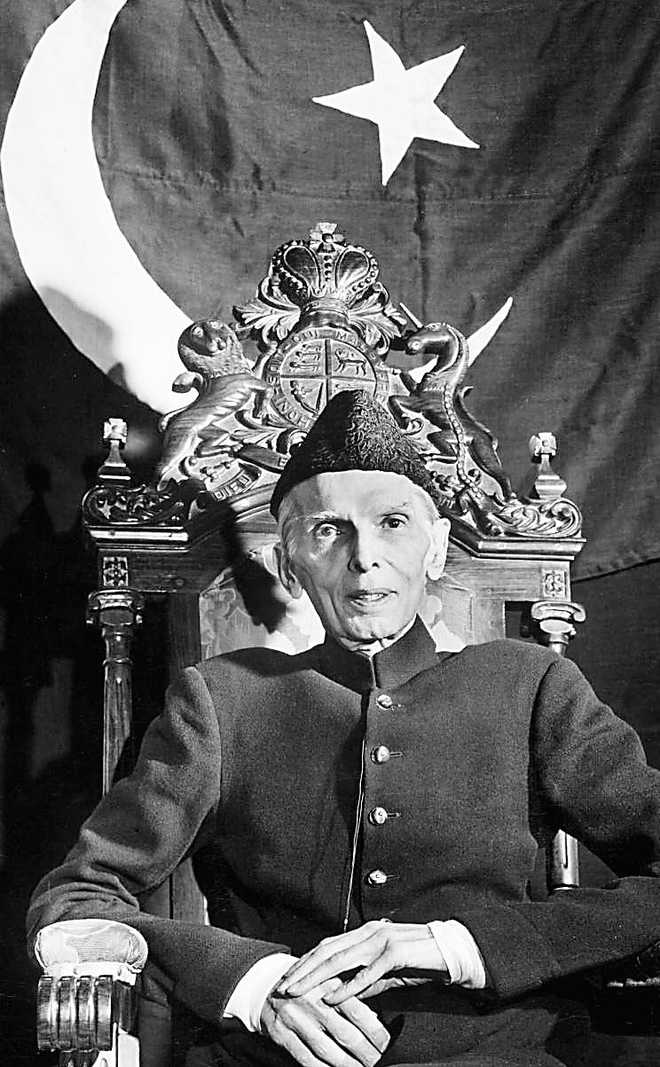Jinnah — The man with a mission
RK Kaushik
IT was 69 years ago on September 11, 1948 that the founder of Pakistan and it's first Governor-General Quaid-i-Azam Mohammad Ali Jinnah died. The time was 10.20 pm in the night, when his feeble heart stopped perennially, leading to his death.
For several years before his death, there was a constant tug-of-war between the Quaid-i-Azam and his physicians. His physicians warned him to take long intervals of rest and do short hours of hard work, but he did exactly the opposite, knowing full well the risk he was running. He cheerfully pursued the task he had set himself: the attainment of Pakistan during his lifetime. And after the establishment of Pakistan and the events that followed, he worked harder still. His unconquerable spirit helped him to ignore the dark forebodings, writ large in his failing health.
Jinnah, the first child of Jinnahbhai Poonjah, an Ismaili Khoja, was born in Karachi on December 25, 1876. His ancestral home was in Paneli, Gondal, princely state in Kathiawar of the Bombay Presidency and his mother tongue was Gujarati. His father had moved to Karachi in search of business.
In the January of 1893, Mohammad Ali Jinnah left for London. He soon developed an interest in law and left the apprenticeship for a legal career and joined Lincoln's Inn and returned to India in 1896. In 1897, he was enrolled as an advocate at the Bombay High Court.
Lucidity of thoughts
As Justice MC Chagla, who worked with him in his chamber for some years, explained: "I read his briefs, went with him to court and listened to his arguments. What impressed me most was the lucidity of his thoughts and expressions. There was no obscure spot or ambiguities about what Jinnah had to tell the court. He was straight and forthright and always left a strong impression, whether his case was intrinsically good or bad."
In December 1906, Jinnah formally joined active politics when he attended the Calcutta session of the Congress as a delegate and honorary personal secretary to President Dadabhai Naoroji, popularly called 'the grand old man of India', known to him since his stay in London.
Jinnah joined the All-India Muslim League in 1913, a Muslim political organisation founded in 1906, after helping it adopt first the goal of "self-government suitable to India." In November 1916, he became the president of the Lucknow session of the league. In 1916, he was also the president of the Bombay Provincial Conference and later of the Bombay branch of Mrs Besant's India Home Rule League. As president of the session at Lucknow, Jinnah had a large share in planning the Lucknow Pact, whereby the Congress and the league reached a settlement of controversies, but it failed to bring permanent peace and fell into desuetude.
He was a member of the committee which, in 1926-27, recommended the setting up of an Indian Sandhurst. He also served on the Reforms Inquiry Committee of members of the Central Legislative in 1923-24. Jinnah associated himself with the boycott of the Simon Commission and with the All-Parties Conference held in Bombay in the spring of 1928.
Jinnah's wife Ruttie, whom he married on April 19, 1918, had stood bravely by his side in his life in the initial years. Ruttie was a daughter of Sir Dinshaw Petit, a Parsi businessman of Bombay, who opposed her marriage to Jinnah, being a Muslim. The mere idea of union between his 16-year-old daughter and 40- year-old Jinnah was unacceptable to him. He had even obtained a court injunction against him until she turned 18. However, as soon as she was a major, Ruttie converted to Islam and tied the knot under Muslim rites. Though not taking part in politics herself, Ruttie remained involved in Jinnah's political activities. On February 20, 1929, Jinnah's young wife passed away after a protracted illness. They had a daughter, born on August 14, 1919, named Dina, whose birth filled their hearts with a new joy and endless pleasure.
Highly strung
Ruttie, in her own words, loved Jinnah as it is given to few men to be loved. Jinnah too, as Dina (later Dina Wadia), testified, loved her mother. But then, the two separated in January 1928, barely a year before Ruttie's death, perhaps, as Kanji Dwarkadas, suggested, "due to temperamental difference and differences in age."
Jinnah attended the Round Table Conference in London in the early 1930s. But he was not satisfied with the attitude of the other leaders. Jinnah got the Lahore Resolution passed on March 23, 1940 in Lahore. It demanded a separate state for the Muslims of India. Unlike the majority of the Muslim population in India, he lived in stately mansions, was tall and elegantly groomed with a distinguished presence of fastidious tastes.
At the right time
Jinnah's case, indeed, proved that charismatic leadership is a relationship, not an isolated phenomenon. Unless the conditions necessary for the emergence of a charismatic leader are ripe, the potential leader, no matter how 'gifted', and how potent his cause, remains without a following.
There is no doubt that Jinnah was able to inspire as well as to win the response of the Muslims as no one else had done before. The Muslims withdrew their allegiance from the prevailing system of government in his favour, as was abundantly clear from the increasing support he received from them after asserting his demand for Pakistan. Hence, they not only followed him enthusiastically, but also surrounded him with the spontaneous cult of personality which is one of the symptomatic marks of charismatic leadership.
Jinnah remained Governor-General of Pakistan from August 15, 1947 to September 11, 1948. The people of Pakistan called him their Quaid-i-Azam (the great leader).
The writer is an IAS officer of the Punjab cadre. His views are personal









